Click on the Calendar link above to see our schedule.


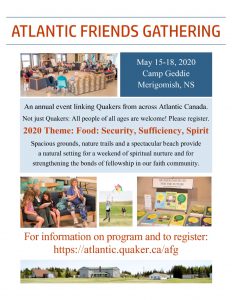
The programmed sessions are interspersed with meal breaks, stretch breaks, and longer periods of free time. Enjoy sessions at your own choice, as well as your own communing with Friends and nature.
On Saturday evening, we hold “Meeting for Readings,” when Friends can share passages of writing that have inspired them. On Sunday evening, we feature “Family Night,” a cheerful talent show of music and other performing gifts by young and old.
Please feel free to enjoy the weekend in your own way!
Presenters – a new program will be designed for May 2021.
Special Interest Groups (SIGs)
A 45-minute time-slot is available on Sunday morning for SIGs. Friends wishing to take advantage of this time to present information or carry out an activity on their “pet subject” should include details in the Comments box of the registration form. Note that the SIGs will run concurrently. Spaces for SIGs will be negotiated at AFG.
Display tables
Some tables will be available for Friends to set up displays. Please indicate your interest in the Comments box of the registration form. Note that room space is limited, so please be prepared to squish into half a table if necessary. Tables will be assigned on site.
Other highlights
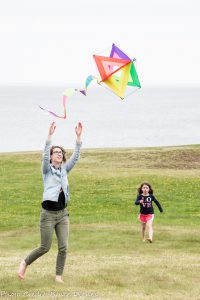 Youth Program
Youth ProgramYouth Coordinator:
Assistant Youth Coordinator:
The Youth Program will have something for children of all ages, offering fun, age-appropriate activities that will include learning about Quakers. Parents, let us know your children’s ages and the choices of activities they might like, so that we can plan for them. Possible activities: Nature walks, crafts, outdoor games, drama – and much more. Would you like to be added to the list of volunteers, especially for younger children? We welcome your assistance for an hour or two during the weekend with the Youth Program. Please indicate your willingness to volunteer in the Comment section of the registration form.
Saturday March 7 & Sunday March 8, 2020
441 Canard Street, Lower Canard, NS.
(opposite Wellington Dyke Road)
Watch the film ”Modified” Share discussion of issues of GMO foods!
Workshop: Learn principles of plant-based diet and cooking!
Presented by the Annapolis Valley Quakers.
Saturday March 7 (Optional. No charge.)
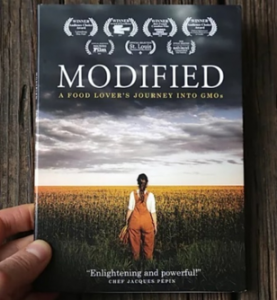 7.00pm – 8:30pm Film screening:
7.00pm – 8:30pm Film screening:
“Modified – a Food Lover’s Journey into GMO’s”
(GMO = genetically modified organism)
Filmed in Annapolis Valley; directed by Aube Giroux
8:30pm – 9:00pm Discussion
9:00pm Social time
Sunday March 8 (Daylight Savings Time)
 10:00am – 11:20am Quaker Meeting for Worship
10:00am – 11:20am Quaker Meeting for Worship
(Optional – click for details.)
11:30am – 4:00pm WORKSHOP
“Food – Nourishment for Body and Soul”
Cost (for food): $15.00
A presentation/demonstration by Bronwen Jones (of Plant Power) & Judy Wilmot. Prepare together, then savour, a variety of easy-to-make dishes for lunch while learning principles of plant-based diet and cooking.
4:00pm – 5:00pm Debrief / tea / closing
We held Quaker study sessions on the theme of Building Trust. The inspiration comes from a workshop Mylene attended at Pendle Hill, called Building Organizational Trust: Working With and Through Others. They had the pleasure of learning from facilitator Clinton Pettus, who presented many interesting ideas as well as a well-crafted process.
In presenting what they had learned at the workshop, they repeated some of the questions and exercises Pettus used. Interesting discussions arose around these:
Some of the techniques for building trust that they took from the workshop were
Have you tried these techniques? How did they work? What techniques do you use for building trust?
The report Mylene wrote about their learning gives more details, why they sought it out in the first place, and how they’ve incorporated it over the year since then.
Thank God Somebody Finally Heard Me: Some Ideas on Building Trust
Why “feeling heard” can help build organizational trust, mediate conflict, improve mental health, promote learning, and save the world… with specific ideas about how to do it
Feel free to use the comments to share your thoughts about the questions above, the report itself, or wherever else this topic takes you.

Marchers with a placard reading in part “we must consciously work”, from an AFSC article “A Letter to my White Sisters After the Women’s March”
Last Saturday, we met for Quaker Study on the topic of Equality. Penni hosted, and prepared some food for thought in the form of quotes and queries.
American Friends Service Committee, the US-based Quaker service organization, publishes a booklet called “An Introduction to Quaker Testimonies.” From it, we considered these queries:
The conversation was informal and thoughtful, ranging over everything from the inherent rights of the Earth to whether socialist concepts can guide us toward equality. Many people contributed ideas from their own spiritual understanding.
Stay tuned for the next Quaker Study (they are scheduled roughly once a month) and consider joining us!
 Annapolis Valley Quaker Meeting hosted a full-day free workshop on Penal Abolition. Quakers Fostering Justice (QFJ), a branch of Canadian Friends Service Committee, offered this workshop across Canada.
Annapolis Valley Quaker Meeting hosted a full-day free workshop on Penal Abolition. Quakers Fostering Justice (QFJ), a branch of Canadian Friends Service Committee, offered this workshop across Canada.
Why is our criminal justice system based on punishment?
Why do we harm people when we could be healing them?
“Never forget that justice is what love looks like in public.” – Cornel West
Penal abolition seeks to shift from punishment to justice that is restorative, transformative and healing – for victims, perpetrators, and society. It is not only about prisons; penal abolition seeks to eliminate the punitive mindset which pervades all of society, by transforming harmful approaches to ones that are healing.
Read more in QFJ’s flier From Harm to Healing: Transforming the Justice System
To learn more about conditions for those incarcerated in Nova Scotia, here are some resources. Please note that these describe experiences of violence and abuse.
Solitary confinement, costs of phone calls, and effects on mental health (El Jones, Halifax Examiner)
Rights don’t stop at prison walls (Anne Farries, The Guardian)
You can read about a similar workshop that QFJ recently offered in Calgary.
Dick Cotterill is a member of Halifax Monthly Meeting and Quakers Fostering Justice. He also sits on the board of the Church Council on Justice and Corrections, is a member of the Canadian Criminal Justice Association, and volunteers in Truro with the John Howard Society.
David Summerhays is the clerk of Quakers Fostering Justice. He is a member of Montreal Monthly Meeting, and has participated in Circles of Support and Accountability’s restorative justice program for 5 years.

Stairs leading to the second floor of Northampton Friends’ meeting space. Published in Friends Journal.

What does the Canada 150 campaign celebrate? Whose perspectives are represented? How does it affect the self-image of those of us who see ourselves as Canadians, and how does it affect relationships between the Indigenous and non-Indigenous people of this land? What are your questions about what this means and what we can do, individually or together?
Short films, radio clips, readings, responses, discussion and reflection.
Light refreshments.
This event was organized by settlers (non-Indigenous peoples) from Annapolis Valley Quaker Meeting and Horizons Community Development Associates, with support from Acadia University’s Community Development Program, in order to help each other unsettle our thinking about the birth of Canada.
In Halifax in October, 2018
Originals at the NS Archives; high-resolution scans are on their website
Jay Soule’s logos are available on clothing, stickers, etc.
“Colonialism 150” logo products available from Eric Ritskes; proceeds to the Onaman Collective’s Indigenous Tattoo Gathering
Questioning Canada 150 was an event held on June 14, 2017 in Wolfville to discuss and reflect on Canada 150 and the relationship between Indigenous and non-Indigenous peoples. The event was organized by settlers (non-Indigenous peoples) to help us unsettle our thinking about the birth of Canada.
 We held an evening of discussion and learning on welcoming seekers and Friends of all sexual orientations and gender identities in our faith community.
We held an evening of discussion and learning on welcoming seekers and Friends of all sexual orientations and gender identities in our faith community. Your ideas, concerns, and questions are welcome. There will be opportunities for individual reflection, small-group conversation, and whole-group discussion. If you have never attended a Quaker meeting for worship but you are interested in this topic, please contact us — we would love to hear from you. We can also help organize carpooling if desired. We look forward to seeing you there.
On World Quaker Day 2016, Annapolis Valley Quaker Meeting invites you to join us for an introduction to the faith and practice of the Religious Society of Friends.
3PM — 4PM: Introduction to unprogrammed Meeting for Worship “in the manner of Friends“
4PM — 5PM: Tea, coffee and snacks; time for conversation and questions
Would you like to know more about how Quakers can have a service with no appointed minister? Or what it’s like to be part of a spiritual community that has a 350-year tradition of gender equality, is queer and trans positive, and works to end war, colonialism, and climate change?
Join us to talk about the role of spiritual community, and ask all those questions about religion you’ve never asked — or never gotten a satisfactory answer to. We may not have the answers, but we welcome inquiring spirits to ask those questions together.
Resource people will be available to speak on various topics of concern to Quakers, in keeping with our traditional testimonies:
You’re welcome to come for either part if you can’t stay for both. Bring snacks to share, or just bring yourself.
If transportation or childcare would be helpful, please contact us to make arrangements.
See or share the event on Facebook
Bruce Dienes and Mylene DiPenta set up a table at Acadia Student Union’s Club Extravaganza last Wednesday night. The event was well attended, and a number of people stopped by our table to chat. Our new banner was finished in time for the event — you can see it in the photos (photo credits are to Bruce, naturally…). We also have a fresh batch of information packages for new attenders. If you’re a member of attender and would like to have some on hand to give away, contact the Outreach Committee. If you’re a seeker or newcomer and you’d like one for yourself… well, contact the Outreach Committee!

In the Quaker Education session of May 2016, Friend Bruce Dienes created a workshop called “Roots and Fruits of our Quaker Faith.” We started by creating individual statements of faith, inspired by John Woolman’s statement about his belief. According to Woolman,
“There is a Principle which is pure, placed in the human Mind, which in different Places and Ages hath had different Names; it is, however, pure, and proceeds from God. It is deep, and inward, confined to no Forms of Religion, nor excluded from any, where the Heart stands in perfect Sincerity. In whomsoever this takes Root and grows, of what Nation soever, they become Brethren.”
We considered a number of other inspirational sources too — from Descartes to Nellie McClung.
Bruce asked us to consider if there was a root of our faith — the bottom line, the origin of other beliefs, the most basic idea we stand on. He then invited us to consider what nourishes that root, and what springs forth from it — in other words, what parts of our lives grow out of that principle. He also provided a variety of supplies we were invited to use to manifest our own “plant” in the Quaker “garden.” From blank paper and words and colouring pages and pipe cleaners, the components of our spiritual “ecosystem” became visible.




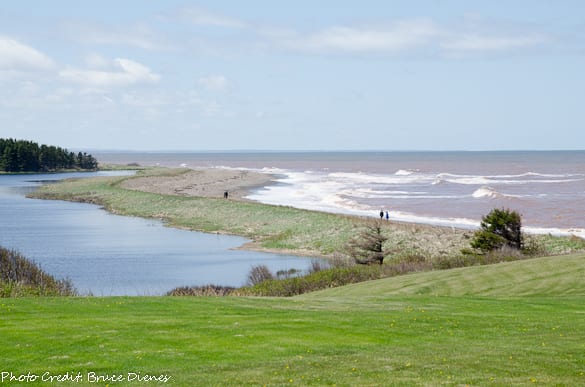
Save the dates of the May long weekend — Friends from the Atlantic provinces and beyond will meet once again for a weekend of shared company and spiritual renewal.
Atlantic Friends Gathering is an annual event linking members and attenders of the Religious Society of Friends (Quakers) from across Atlantic Canada. We gather at Camp Geddie, a Presbyterian Church camp on Nova Scotia’s North Shore. The spacious grounds, with nature trails and a spectacular beach on the Northumberland Strait provide a natural setting for renewal of our individual and group spirit.
This year the themes include “Sharing the Spirit in Our Lives” and “Actions to Assist Healing Between First Nations and Settlers.” The programme is not finalized yet, but previous years have included film screenings, nature walks, discussions on spiritual and social justice topics, games, storytelling, dancing, and of course Meeting for Worship. As in previous years, there are no compulsory activities — and there may be kayaks and canoes available to borrow. The healing atmosphere of being in a welcome nature retreat offers an opportunity to open ourselves up to whatever we feel lead us.
Contact Maida Follini for more info or to propose a Special Interest Group. You can also check last year’s AFG website to see example activities and registration details. Signup for email notification (at right) to get this year’s info as soon as it’s published.
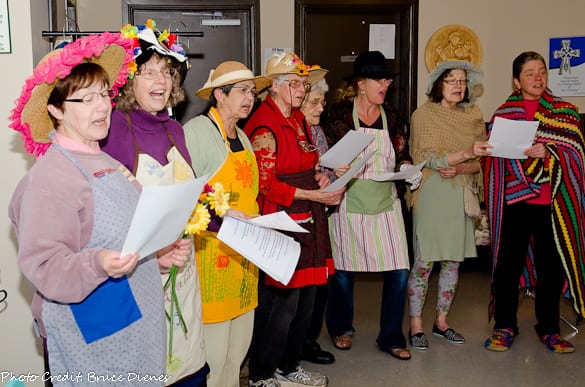
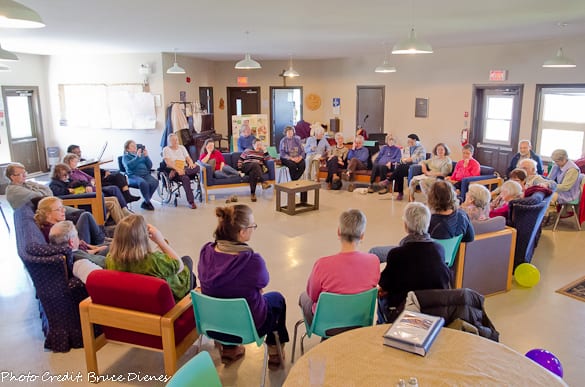
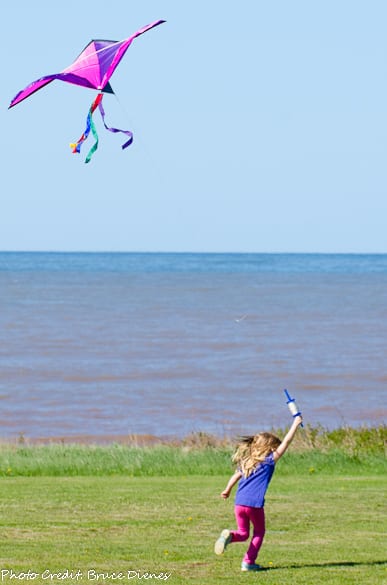
Ethical Dilemmas in Synthetic Biology: a presentation by Annapolis Valley Quakers
Information and discussion open to all.
Wednesday September 4, 7-9 pm
NSCC Kingstec Campus, 236 Belcher St. Kentville Room C278
Google map: http://goo.gl/maps/2TJXg
For background info download this PDF document: www.bit.ly/SynthBioKit
Contact:
Below is a brief extract from the document referenced above. For full details, read particularly section three of the above linked document.
The document includes extensive references and links to relevant web sites.
Synthetic Biology: What is it and what is the range of views about its role?
Synthetic biology is the use of computer-assisted, biological engineering to create new biological systems and forms of life that do not exist in nature.
In 2011, a U.S.Presidential Commission defined synthetic biology as “an emerging field of research that combines elements of biology, engineering, genetics, chemistry, and computer science… [It relies] on chemically synthesized DNA [a building block of all living cells], along with standardized and automatable processes, to create new biochemical systems or organisms with novel or enhanced characteristics.”
Proponents of synthetic biology see its potential for developing new materials (e.g., a synthetic version of spider silk), foods (providing food in quantity in developing nations), medicines (e.g., production of an anti-malarial drug), energy sources (e.g. biofuels from algae), ways to remedy pollution (eg. detecting arsenic in water sources), and new means of computing. The military-industrial sector also sees potential weapons applications.
Those who are cautious about synthetic biology direct attention to what is absent in its development. They are concerned about what artificial organisms might do unexpectedly, since they have not yet existed in nature. They are concerned about the social justice aspects of synthetic biology: will the benefits of synthetic biology be distributed equitably among poor nations as well as wealthy ones? Will patenting of life forms lead to monopolistic control of benefits? Will large amounts of public funds be spent on unproven technology?
The Principles for the Oversight of Synthetic Biology, developed by a broad coalition of organizations from around the world (including the Biotechnology Reference Group of the Canadian Council of Churches) begins with:
Synthetic biology, an extreme form of genetic engineering, is developing rapidly with little oversight or regulation despite carrying vast uncertainty. To protect public health, worker safety and ecosystem resilience, it calls for risk research and development of alternatives, a robust pre-market regulatory regime, strong enforcement mechanisms, immediate action to prevent potential exposures until safety is demonstrated, ongoing monitoring for unintended consequences, immediate action to prevent potential exposures until safety is demonstrated…a ban on using synthetic biology to manipulate the human genome in any form, no commercialized or released (building blocks) without full disclosure to the public of the nature of the organism and results of safety testing, and … a moratorium on the release and commercial use of synthetic organisms and their products to prevent direct or indirect harm to people and the environment (until government bodies, international organizations and relevant parties implement strong precautionary and comprehensive oversight mechanisms).
Marilyn Manzer delivered the 2011 Sunderland P. Gardner lecture on “The Moral Economy” to a full house at the Fouuntain Performing Arts Centre at King’s Edgehill School on Wednesday, August 10th. In describing her life-long journey of concern on this issue, she wove together threads of economics, history, philosophy, music and beauty and presented an alternative vision to our current greed-based economy. The lecture is published as a Canadian Quaker Pamphlet. See also http://www.quaker.ca/Publications/SPG/ for the audio.





